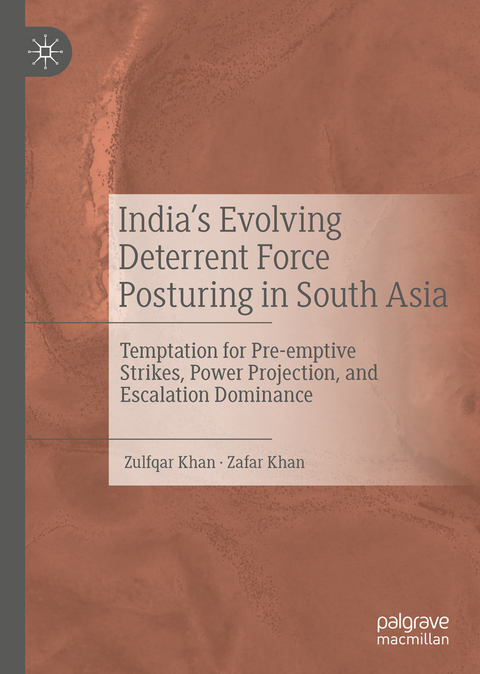
India’s Evolving Deterrent Force Posturing in South Asia
Springer Verlag, Singapore
978-981-15-6960-9 (ISBN)
The book discusses India’s evolving deterrent force posturing in South Asia under the conceptual essentials of nuclear revolution when it comes to various combinations of conventional and nuclear forces development and the strategic implications it intentionally or unintentionally poses for the South Asian region. The book talks about how the contemporary restructuring of India’s deterrent force posture affects India’s nuclear strategy, in general, and how this in turn could affect the policies of its adversaries: China and Pakistan, in particular.
Authors discuss the motivations of such posturing that broadly covers India’s restructuring of its Nuclear Draft Doctrine (DND), the ballistic missile development program, including that of its Ballistic Missile Defence (BMD) system, and the possibility of conflicts between China-India and India-Pakistan, given their transforming strategic force postures and their recurring adversarial behavior against each other in the Southern Asian region.
Zulfqar Khan serves as a Professor, Head of Department at the Department of Strategic Studies, National Defence University, Islamabad, Pakistan. Professor Khan has wide experience as a research analyst in the Pakistan Ministry of Defence (MoD), several policy think tanks in Pakistan, and more recently National Defence University, Islamabad. He has contributed more than 45 research articles (both leading national and international journals), and a number of policy papers in this regard including his book on Nuclear Pakistan: Strategic Dimensions (2011). Zafar Khan is currently an Assistant Professor with the Department of International Relations, University of Balochistan, Quetta. He has also taught at the Department of Strategic Studies, National Defence University, Islamabad, Pakistan. His papers have appeared in various international peer-reviewed journals. He has authored Pakistan’s Nuclear Policy: A Minimum Credible Deterrence (2015) and Nuclear Deterrencein South Asia: New Technologies and Challenges to Sustainable Peace (2020).
Chapter 1 Introduction.- Chapter 2 Geostrategic Environment of South Asian Region.- Chapter 3 India’s Maritime Strategic Outreach in the Indian Ocean Region: Power Projection and Escalation Dominance.- Chapter 4 India’s Doctrinal Restructuring: Posturing for Punitive Counterforce Strategy.- Chapter 5 India’s Evolving Strategy for Ballistic Missile Development Programme for Southern Asia: Motivations and Challenges.- Chapter 6 Conceptualizing India-Pakistan’s Competing War-Fighting Strategies and Possibility of Conflict in South Asia.- Chapter 7 India’s Evolving Deterrent Posturing: Post Pulwama Military Crisis 2019.- Chapter 8 Revisiting the Proposed Strategic Restraint Regime for South Asian Region: Challenges and Opportunities for Sustaining Peace and Stability.- Chapter 9 Conclusion.
| Erscheinungsdatum | 16.01.2021 |
|---|---|
| Zusatzinfo | XI, 381 p. |
| Verlagsort | Singapore |
| Sprache | englisch |
| Maße | 148 x 210 mm |
| Themenwelt | Sozialwissenschaften ► Politik / Verwaltung ► Europäische / Internationale Politik |
| Sozialwissenschaften ► Politik / Verwaltung ► Politische Systeme | |
| Sozialwissenschaften ► Politik / Verwaltung ► Vergleichende Politikwissenschaften | |
| Schlagworte | Doctrinal Postures • Indian Deterrent Forces • South Asia • South Asian Strategic Environment • War-fighting Strategies |
| ISBN-10 | 981-15-6960-6 / 9811569606 |
| ISBN-13 | 978-981-15-6960-9 / 9789811569609 |
| Zustand | Neuware |
| Haben Sie eine Frage zum Produkt? |
aus dem Bereich


